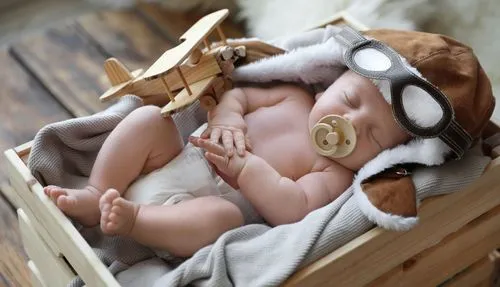Understanding baby sleep: A comprehensive guide for parents
May 28, 2023
Katka

Becoming a parent for the first time is a wonderful experience. However, this new role also comes with many questions: How much do babies sleep? How often do I feed them? How do I get them to sleep?
Each baby is different, and the same applies to the baby's sleep. It's very important to know the basic facts, though. It can help you improve your child’s sleeping habits, and it also makes your life a little easier.
We have put together a baby sleep guide to help you understand the basics about baby sleep.
How much should babies sleep
Babies, cute and cuddly, are also known for their peculiar sleep patterns. But how much sleep do they really need? Let's peel back the covers and take a look.
Newborns
Newborn babies sleep a lot – about 16 to 18 hours a day. But it isn't all in one go. They sleep in spurts throughout the day and night, each lasting from a few minutes to several hours. Interesting, right?
Infants
As babies grow, their sleep patterns begin to change. By the time they're three months old, they start sleeping more at night, up to 10 hours, with additional daytime naps.
Toddlers
Toddlers need about 12 to 14 hours of sleep, but unlike infants, they spend more time in active sleep, which is necessary for the incredible brain development occurring at this age.
Do you want to know more about baby sleep? Continue reading:

The importance of sleep for babies
Why is sleep so vital for babies, you ask? Well, sleep isn't just essential for rest and rejuvenation. In babies, sleep plays a far more critical role – it promotes growth. Yes, you read it right. Growth hormones are primarily secreted during deep sleep. Apart from supporting physical growth, sleep also fuels the brain, helping babies learn better and consolidate memories.
Babies experience the same sleep cycles as adults, but they're far shorter than those of adults. Interestingly, babies spend more time in rapid eye movement (REM) sleep, which is a lighter phase of sleep often associated with dreaming. This REM sleep stage is believed to contribute to the immense mental and cognitive development happening during a baby's first few years.
Sleep patterns and issues
Just like adults, various factors can affect a baby's sleep. These can range from their age, developmental milestones, and even their overall health and wellness. For instance, babies might sleep more when they're going through a growth spurt or when they're not feeling well. It's essential to pay attention to these cues and adapt to changes in your baby's sleep patterns.
Also, spotting sleep problems is crucial. Some common signs can include frequent night awakenings, difficulties in falling asleep, snoring, or irregular breathing during sleep. Always consult your pediatrician if you notice any of these signs or if you're generally concerned about your baby's sleep.
It can be difficult to keep track of your baby's sleep, so it's a good idea to use a baby monitor that, in addition to video and audio streaming, stores sleep information in the Activity log that you can review and discuss with your pediatrician.

Developing a baby sleep schedule and ensuring safety
Creating a baby sleep schedule isn't an overnight task – it takes time and patience. A sleep schedule or routine can guide your baby to distinguish between day and night, helping them understand when it's time to sleep. This routine can include soothing activities like a warm bath, a quiet story, or a lullaby. Remember, the goal is to make your baby feel secure and comfortable, readying them for a good night's sleep.
Lastly, safety during sleep is paramount. This includes laying your baby on their back to sleep, ensuring their crib is free of any loose bedding, blankets, pillows, or soft toys, and maintaining the room at a comfortable temperature. Read our safety tips for safe sleep.
"The goal is to make your baby feel secure and comfortable, readying them for a good night's sleep."
Appropriate clothing and sleeping temperature
Dressing your child appropriately for sleep is essential to ensure their comfort, which directly affects the quality and length of their sleep. The rule of thumb is to dress your baby in one extra layer of clothing than you would be comfortable with at the same room temperature. The aim is to create a sense of comfort and thermal comfort for sleep, i.e. to ensure that the baby is neither too cold nor too hot. The most common sleepwear choices include soft, breathable and well-fitting onesies. In colder temperatures, consider using a sleep sack to provide additional warmth while maintaining safety. Avoid loose blankets, which can pose a suffocation risk.
When it comes to sleeping temperature, children sleep best in cooler environments. The recommended room temperature for a sleeping baby is between 68-72 degrees Fahrenheit (20-22 degrees Celsius). It is essential to monitor and adjust the temperature in the room where the child sleeps to maintain this range. Although it may be tempting to cover the baby or raise the temperature in cold weather, remember that overheating can be a risk factor for Sudden Infant Death Syndrome (SIDS).
A baby's body has not yet developed the complex internal temperature regulation mechanisms that adults have. Therefore, it is very important to check your baby for signs of being too hot or too cold. Signs of overheating include damp hair, flushed cheeks, heat rash and rapid breathing. On the other hand, if your child is too cold, you may notice cold hands and feet or your child's skin may seem a little paler than usual.

7 interesting facts about baby sleep
Understanding your baby's sleep is not just about when and how long they sleep, but also about the fascinating intricacies and phenomena that accompany their slumber. Let's take a look at some!
1. Babies need sleep for brain development
Sleep isn't just for rest; it's an essential component of your baby's brain development. During REM sleep periods, the brain processes and consolidates information from waking hours to form memories. Furthermore, during the first three months of a baby's life, their brain expands by 1% per day. This rapid growth might explain why infants spend so much time in REM sleep. This phase of sleep is critical for fostering creativity, problem-solving abilities, and overall cognitive development.
2. Newborns confuse day and night
Initially, newborns don't differentiate between day and night. Their sleep patterns can seem random and unpredictable. However, with exposure to natural light during the day and keeping surroundings dim at night, babies slowly learn the difference. This distinction aids in regulating melatonin production, a hormone naturally released by our bodies to initiate sleep. Over time, babies start to form a more consistent sleep-wake cycle.
3. To sleep well, a baby must be well rested
Contrary to what some may believe, a well-rested baby sleeps better at night than a tired one. Depriving a baby of sleep during the day in hopes of them sleeping better at night usually backfires. When overtired, babies find it harder to settle down for sleep and may wake up more frequently throughout the night. Instead, focus on promoting healthy naps during the day to help your baby sleep well at night.
4. Light sleeping is good
While parents might wish for their babies to sleep deeply, light sleeping is an important evolutionary adaptation. Light sleep allows babies to awaken easily in response to hunger, discomfort, dirty diapers, or potential danger. It's a protective mechanism designed to ensure the baby's safety and survival.
5. Babies sleep a lot, parents don’t
Babies require a significant amount of sleep, which often results in a severe sleep deficit for new parents. During the first year of a baby's life, parents can lose up to 2 months of sleep. While this might seem like a daunting fact, remember, this phase doesn't last forever, and seeking help or sharing night duties can make it more manageable.

6. Sleep evolves in time
Setting a regular baby sleep schedule takes time, but it is certainly worth the effort. The best way to help your baby to sleep soundly is to give it time. All babies eventually develop self-soothing skills and start sleeping for longer periods and more peacefully. Remember that next time you will try to put your baby to sleep again at 2 am and instead of being desperate, just enjoy the extra cuddles that come with this season.
7. Rice cereal for better sleep is a myth
There's no shortage of myths surrounding baby sleep. One such myth suggests that adding rice cereal to a baby's bottle will help them sleep longer. However, this belief isn't backed by scientific evidence. Solid foods or rice cereal have not been proven to enhance sleep duration or quality. Moreover, a baby's digestive system isn't ready to handle solid foods until they are about six months old. The best approach to improving your baby's sleep is by establishing consistent sleep habits and creating a conducive sleep environment.
Learn more about baby sleep with our guides
If you're here, your baby’s sleeping patterns might feel like a mystifying puzzle you're trying to piece together. Every parent has been there, gazing at their little one, wondering, "Just how much sleep do you really need?" or "Is this schedule 'normal'?"
We get it. The journey to understanding your baby’s sleep can be filled with endless questions and late-night Google searches. That's why we've lovingly crafted these guides, drawing from expert knowledge and fellow parents’ experiences.
Dive in, and discover the insights that’ll not only answer your questions but also bring peace to those precious bedtime moments.
The perfect bedtime routine for kids based on age
Whether you’re a new parent or about to add another beautiful baby to your family, it’s important to develop a bedtime routine for them. Our article has all the tips and tricks you need to know to make the perfect bedtime routine for your little one and we’ve even structured our tips into different age groups!
Learn more about creating the perfect bedtime routine for your kids here.
Baby safety tips for parents for safe sleep
Ensure sweet dreams for your little one with our comprehensive safety tips. From cribs to sleep position, master the essentials to create a safe sleep environment.
Learn more about keeping your baby safe while sleeping here.
The complete guide to baby sleep when travelling
Planning a holiday with your newborn baby? Navigating time zones, hotel rooms, and jet lag can be smooth. Unpack our guide and travel with bedtime confidence.
Learn how to help your baby sleep while travelling here.
How does daylight savings affect a baby's sleep?
Clocks change when Summer comes and goes, but babies? They're a different story. Discover the effects of daylight savings on sleep and adjust routines effortlessly with our insights.
Learn how daylight savings can affect your baby’s sleep here.
How and why to track your baby's sleeping patterns
Unlock a deeper understanding of your baby’s rest with our guide. Explore the benefits of tracking sleep, and how it can lead to better bedtime habits for your baby.
Learn how and why you should track your baby’s sleep patterns here.
Newborn to 12 months: The complete sleep guide
From first yawns to dreamy nights, navigate your baby's first year of sleep with clarity. Delve into schedules, patterns, milestones and more with our complete guide.
Discover our complete guide to helping your newborn sleep here.
Toddlers' sleep: A complete guide from 12 months further
Toddlers: endless energy by day, unique sleep needs by night. Journey through this dynamic phase and ensure restful nights with our expert guidance.
Discover our ultimate guide to helping your toddler sleep here.

Frequently asked questions
1. Why do babies fight sleep?
Babies might fight sleep if they're overtired, not feeling well, or going through a milestone or growth spurt. Sometimes, a lack of routine can also make it harder for babies to settle down.
2. Why do babies cry in their sleep?
Babies might cry in their sleep due to discomfort, nightmares, or a disruption in their sleep cycle. It's a good idea to wait for a few minutes before intervening to see if they can self-soothe.
3. At what age do babies sleep through the night?
While some babies might start sleeping through the night around three months of age, it's common for some babies to take a little longer. Remember, each baby is unique.
4. Do babies sleep more when teething?
Some babies might sleep more when teething, while others may have their sleep disrupted by the discomfort. Offering a teething toy or a cold washcloth can provide some relief.
5. Is co-sleeping safe?
Some types of co-sleeping are safe, while others may pose risks for an infant.
Conclusion
Understanding "how much babies should sleep" is more than just quantifying sleep hours. It's about recognizing your baby's unique sleep patterns and meeting their individual needs. Each baby is unique, and their sleep schedule will reflect this.
Remember, navigating through your baby's sleep patterns can be challenging, but it's also a transient phase. What seems to be an endless cycle of wakefulness and restlessness will gradually settle into more predictable patterns.
As you make your way through this journey, remember to trust your instincts, be patient, and take care of your own wellbeing. The insights shared in this article are designed to guide you through this process and help you create a sleep pattern that works for both you and your baby. Here's to tranquil nights and happy parenting!
Continue reading...
Show all articlesCopyright & trademark notices
Apple, the Apple logo, and iPhone are trademarks of Apple Inc., registered in the U.S. and other countries and regions. App Store is a service mark of Apple Inc. Mac App Store is a service mark of Apple Inc. Google Play and the Google Play logo are trademarks of Google LLC. Windows® and the Windows logo are either registered trademarks or trademarks of Microsoft Corporation in the United States and/or other countries. Linux® is the registered trademark of Linus Torvalds in the U.S. and other countries.


